Mick Malthouse, Dermott Brereton, Ross Lyon and Mark Robinson select the best 30 footballers of the past 30 years
How hard was it for our panel of experts to pick the best 30 players of the past 30 years? Find out who was No.31 and the other key names that led to long debates. Plus, have your say on the final list.
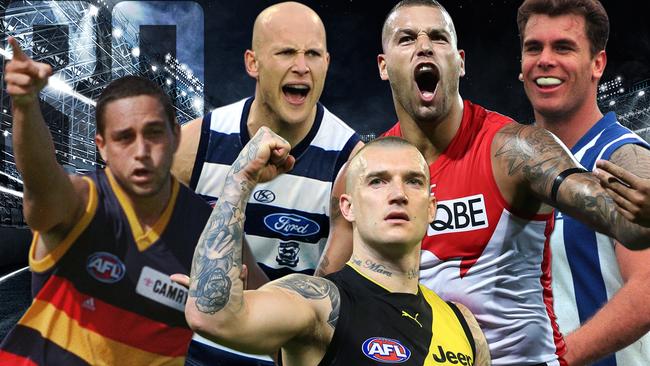
AFL News
Don't miss out on the headlines from AFL News. Followed categories will be added to My News.
The assignment: Select the best 30 players of the past 30 years to celebrate the 30th birthday of the Herald Sun.
The panel: Mick Malthouse, Dermott Brereton, Ross Lyon and Mark Robinson
The criteria: The player had to play 100 games from 1990 onwards, which created internal debate about the crossover careers (pre 1990) of Greg Williams, Stephen Kernahan, Craig Bradley, Tony Lockett and Jason Dunstall, for example.
The outcome: Plenty of agonising soul-searching and, ultimately, the best and most influential players in their position or a multitude of positions.
There were curious selections.
Brereton largely ignored the crossover careers, so plumped for Sydney’s Barry Hall over teammate Jason Dunstall and Tony Lockett.
Malthouse didn’t select Peter Matera and the other three did. Malthouse selected Jim Stynes and the other three didn’t.
Lyon included Darren Jarman, myself and Lyon selected Gavin Wanganeen, Lyon didn’t include Jonathan Brown, I didn’t include Matthew Pavlich.
Malthouse liked Bulldog Scott West, whereas Brereton included Anthony Koutoufides, Brent Harvey and Jimmy Bartel and left out Adam Goodes.
We each then cast our votes for the 30 players we liked.
Fourteen players had four votes – that is a vote from each member of our panel.
Ten players had three votes – a vote from least three members of the panel.
That gave us 24 certain starters.
We then had a secondary round of voting – combining the 23 players who had two or one vote to their name — to determine the final six.
This is the final list of 30.
THE VOTING
FOUR VOTES: Wayne Carey, Lance Franklin, Dustin Martin, Gary Ablett Jr, Nathan Buckley, Scott Pendlebury, James Hird, Joel Selwood, Luke Hodge, Chris Judd, Robert Harvey, Michael Voss, Stephen Silvagni, Nick Riewoldt.
THREE VOTES: Cyril Rioli, Simon Black, Gary Ablett Sr, Andrew McLeod, Adam Goodes, Matthew Pavlich, Peter Matera, Matthew Scarlett, Tony Lockett, Glen Jakovich.
TWO VOTES: Jonathan Brown, Darren Jarman, Patrick Dangerfield, Matthew Lloyd, Nathan Fyfe, Jason Dunstall, Dane Swan, Mark Ricciuto, Gavin Wanganeen
ONE VOTE: Greg Williams, Sam Mitchell, Matthew Richardson, Barry Hall, Anthony Koutoufides, Jason Akermanis, Shaun Burgoyne, Brent Harvey, Jimmy Bartel. Chris Grant, Dustin Fletcher, Scott West, Jim Stynes, Ben Cousins.
MALTHOUSE: HOW I PICKED MY 30 SUPERSTARS
Mick Malthouse
From 1990 to 2020 there have been so many good players, fewer great players, and fewer still the greatest of the greats.
Logic tells us that the greater numbers will come from the midfield, as these players are always around the ball gathering possessions, and the best of them are multi-positional players who can also push forward for goals.
One key factor for me is the longevity factor. Some players come in, play brilliantly for a short time, and then fade.
The ones who stand the test of time, who play through good times and tough times at the club and are consistent throughout, are the true heroes — such as Dustin Fletcher, who spent 23 years at Essendon, played 400 games, and played on all of the best full-forwards.
Some of these players have won a Brownlow but not a club best-and-fairest.
Some of the greatest players don’t even own a Brownlow Medal.
Lance Franklin has won just a single best-and-fairest award between two clubs (at Hawthorn in 2008), but he is certainly in the top 30.
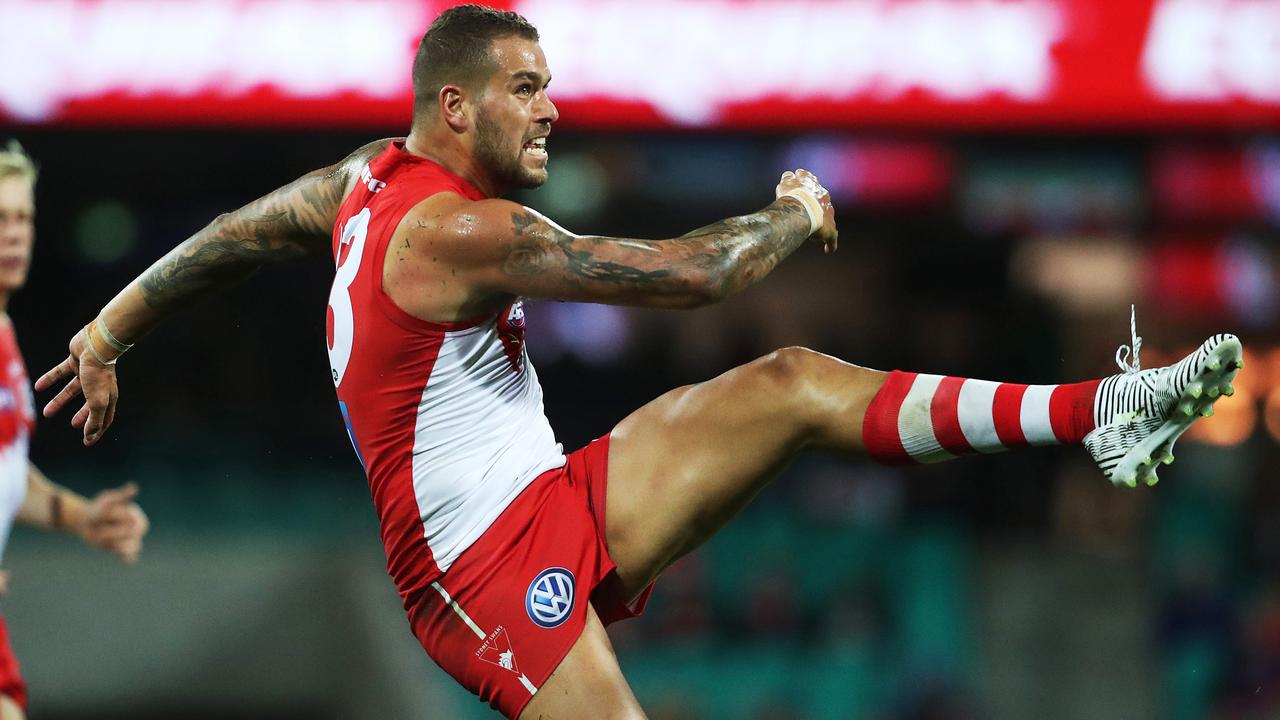
Not all the greats have played in a Grand Final, but if so they have demanded the stage and that is the true sign of a star. Dustin Martin has twice won the Norm Smith medal.
It is easy to be swayed by current form when picking a list of great players so you really have to compare the pair when weighing up today’s picks against yesteryears.
My dilemma was with key backs.
Glen Jakovich is the best centre half-back I’ve seen, along with full-backs Stephen Silvagni and Matthew Scarlett, so when I put Alex Rance up against these names, plus Fletcher, I couldn’t find space to squeeze him in.
Most of these players, if not all, will have been named as an All-Australian at some stage of their career, but it is not a prerequisite.
Craig Bradley has been named in seven All-Australian teams (four since 1990) but I still couldn’t find a spot for him.
Gary Ablett Sr and Gary Ablett Jr have collected 17 nominations between them, and I have named them both.
Robert Harvey never won a premiership, but he was named eight times as an All-Australian, and twice the Brownlow Medallist.
He is fourth overall for number of Brownlow votes, Gary Ablett Jr is first. They are both part of a long list of midfielders.
I thought long and hard about Patrick Dangerfield’s inclusion, but it came down to him and his teammate.
Joel Selwood has been captain of the Cats since 2012, and with that comes extra responsibility and pressure. Like Dangerfield he has won three club best-and-fairests, but he alone is also a triple premiership player.
A premiership doesn’t determine automatic inclusion but it is significant.
I only have one ruckman, though the list of great rucks is extensive.
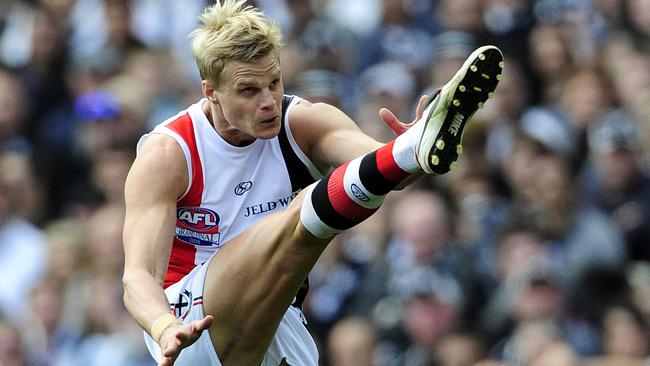
For me Jim Stynes was unique, simply by the way he revolutionised the mobility of the ruckman and the agility of the midfield. Plus he won a Brownlow.
I’ve always thought the job of the permanent key forward is the toughest job of all.
They simply have to perform each week. But with limited space it means that someone like Jason Dunstall, with an amazing 1254 career goals at an average of 4.66 per game, misses out to dominant full-forward Tony Lockett (1360 goals/4.84 per game avg,) and unbelievable centre half-forward Wayne Carey (722 goals.)
Plus Jonathan Brown (594 goals,) Matthew Pavlich (700 goals,) Chris Grant (554 goals,) and Stephen Kernahan (738 goals.)
I had to remind myself that this wasn’t the best team, but the best 30 players of the last 30 years.
So these players, in my mind, are the hardest players to play on, or take on.
I was tempted to fit in Mark Ricciuto, Paul Roos, Alex Rance, Brad Johnson, Peter Matera, Sam Mitchell, Shaun Burgoyne, Andrew McLeod, Matthew Richardson, Brent Harvey, Anthony Koutoufides, Warren Tredrea, Dean Cox, and many more.
But, it’s the best 30 players, not 30 plus.
DERM: HOW I PICKED MY 30 SUPERSTARS
Dermott Brereton
It’s nearly impossible to outline the selection boundaries when selecting my best 30 players of the past 30 years.
Players such as Greg Williams, Jason Dunstall, Gary Ablett Sr, Stephen Kernahan, Chris Langford and Tony Lockett all reach the mark of 100 games played post round 1 in 1990.
And all are deserved of a position in this list according to the criteria.
But in my thinking, there was so much of a dramatic change to the football landscape around the turn of the century.
And that they had already reached their peak before 1990 (even though they maintained it), my choice is to leave them out.
But, then again, players like Silvagni started before the ’90s, but made it all the way through to the 2000s, so I’ve qualified him.
And that is the beauty about opinion-based selection — it is all in the eyes of he that is doing the selecting.
Some player’s statistical numbers stack up.
And the weight of those numbers can’t be ignored, just like Boomer Harvey’s games record.
Other players such as Cyril Rioli fall behind in the numbers game, but his influence on the sport has been as dramatic as any of the other all-time greats.
Clearly, the reader will see that I have a leaning towards key forwards and or forwards who could swing a game on the back of their own efforts.
The midfielders I have selected — apart from being champions — owned a physical capability that sets them aside from merely accomplished AFL players.
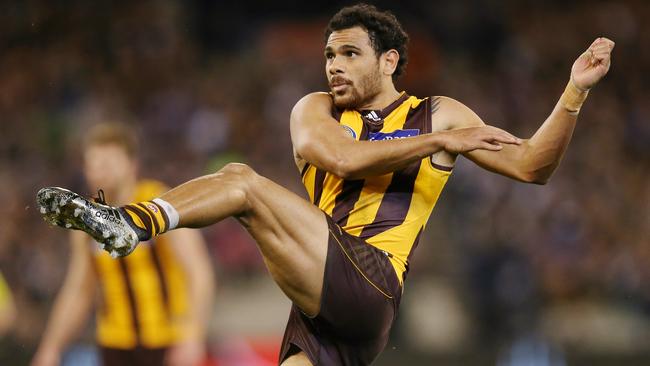
The champs standout such as:
Wayne Carey: The best key forward we’ve seen since John Coleman (I think, even though I’m not sure, I have never seen footage of Coleman).
Lance Franklin: Along with Gary Ablett Sr, the best natural athlete captured on modern television.
Chris Judd: there was a span of several years when Judd’s football was the most devastating midfield football I have ever seen. After injury set in, he slipped back a notch to only be awesome.
Sam Mitchell: Changed the way that football was played around stoppages.
Matthew Richardson: As a player he was awesome. If you were a Tigers fan, Richo was a journey you’d live through each weekend.
Cyril Rioli: He has done things we have never seen before.
Michael Voss: Toss up against Hodge as to who was the best captain of this 30-year event.
I chose players that others might overlook.
One is Barry Hall. To be “The Man” forward of the football when Sydney was playing a style that thwarted every forward in the competition, including their own, Baz was a colossus.
Another is Shaun Burgoyne. He is the Indigenous games record holder. Played as a full-back, a half-back, half forward, full-forward and all with brilliant results.
But his best football has been in the middle, where Alastair Clarkson used to “break the glass in case of emergency” approach.
Another is Jimmy Bartel. He was Geelong’s Burgoyne. Turn to Jimmy whenever the great Geelong teams needed something above and beyond.
And even now, he still sees the game a step before all others.
Clearly, it’s so difficult to leave out players such as Dean Cox, Alex Rance, Brad Johnson and Adam Goodes and there is no need to sell them down in an attempt to justify the selection.
Beauty is in the eye of the beholder, after all.
LYON: HOW I PICKED MY 30 SUPERSTARS
Ross Lyon
If the rating is out of 1-10 per game these players would rarely drop below a five and were consistently in the 5-7 range and then frequently delivered a rating of 8-10 in games.
I certainly gave a heavy weighting to premiership and Grand Final team players and those in the teams that created an era such as Geelong, Brisbane and Hawthorn.
The notable exception were the Kangaroos who played in seven preliminary finals and three grand finals for two premierships and only Wayne Carey is in.
It talks to their evenness and system or my lack of judgment.
The player has to possess the mental fortitude to deliver physical courage, courage to run and the desire to have the ball in their hands in the big moments or win the contests that turn games.
This player provided the inspiration to the team and was the guiding force throughout home and away and the final series.
I have strong bias to the engine room where games are won and lost — the midfield.
Strong bias toward key position players particularly forwards.
Small forwards and backs must have created new dimensions to the role.
Strong bias towards playing and delivering in finals particularly preliminary and Grand Finals where expectation, anxiety and competition is at its fiercest and there’s nowhere to hide.
When thinking and picturing these players it is easy to recall the big moments and games they starred in during the finals.
For example, Andrew McLeod v North Mebourne in the 1998 Grand Final.
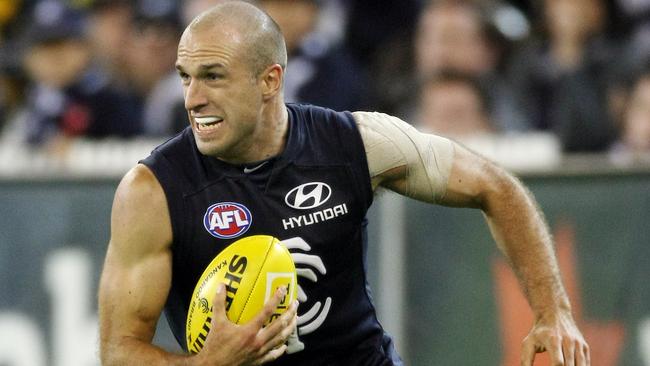
He intercepted and countered at half-back and then shifted midfield to hit Darren Jarman lace out.
Wayne Carey’s 1994 finals series. Darren Jarman versus St Kilda and his fourth-quarter goals and then the following year against North. Just extraordinary.
Cyril Rioli’s influence in 2008 as a first-year player — pressure and skill.
Luke Hodge v Geelong in 2008, intercepting across half-back.
Chris Judd in a losing grand final in 2005 — nine clearances in the first quarter, with a tag.
Players on my list almost overwhelmingly required opposition teams to strategise and plan in an attempt to blanket their influence.
Like in the midfield. Robert Harvey would need multiple opponents to be able to keep up. Judd forced Sydney to develop cover roles to stop his explosive run out of stoppages.
Goodes was so explosive that team defences would have to check and handover to be able to handle him once he was out goal side.
James Hird, Dustin Martin, Michael Voss and Goodes dictated that opponents needed aerial capacity for when they push forward.
Swan used the interchange in a way that had never been used before to keep his speed and power up.
Martin playing midfield centre-forward and deep forward working in with Kane Lambert creates nightmares for opposition defence and midfield organisation.
I could bang on forever, but all have played in the biggest finals, have stood up without question and nearly all have dominated those game from their position or positions.
I certainly put a premium on key forwards, key backs and inside midfielders and really valued midfielders who went to dominate other positions, such as Jarman, Hird, Goodes, Hodge, Martin and Gary Ablett Jr.
MORE AFL
Fox Footy Jury Trade Edition: Will the Essendon exodus continue? Could Brad Crouch land at Carlton?
AFL Draft 2020: Check out the best small-medium forwards from the NAB League
I also put a strong value on the ability to be an architect with the ball, either by hand or foot by the midfielders, which helps explain the notable omissions of Dangerfield and Fyfe — they maybe a product of the modern game, but the midfielders I had in were all elite with the ball in hand and I think they fall behind in that area.
The inclusion with most internal debate was Cyril Rioli because it forced out Alex Rance from my 30.
Cyril’s ability to apply small-forward pressure, take mark of year and kick goal of year and do it consistently in finals, starting in his rookie year in 2008, made him a must and saw him take the small forward position to another dimension.
To mark the Herald Sun’s 30th birthday milestone, over 30 days we will celebrate all that makes Victoria and Melbourne great. Our coverage will include the state’s 30 most influential people of the past 30 years, greatest sporting moments, and best photos. To get your special Mark Knight 30th souvenir cartoon visit the Herald Sun Shop online store. Subscribers can also purchase a limited edition print at heraldsun.com.au/rewards
Originally published as Mick Malthouse, Dermott Brereton, Ross Lyon and Mark Robinson select the best 30 footballers of the past 30 years

